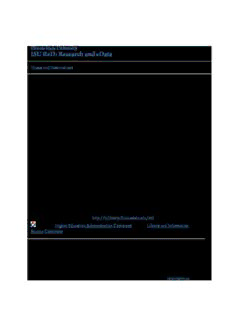
Librarians and Student Affairs Professionals as Collaborators for Student Learning and Success PDF
Preview Librarians and Student Affairs Professionals as Collaborators for Student Learning and Success
Illinois State University ISU ReD: Research and eData Theses and Dissertations 3-24-2016 Librarians and Student Affairs Professionals as Collaborators for Student Learning and Success Dallas Long Illinois State University, [email protected] Follow this and additional works at:http://ir.library.illinoisstate.edu/etd Part of theHigher Education Administration Commons, and theLibrary and Information Science Commons Recommended Citation Long, Dallas, "Librarians and Student Affairs Professionals as Collaborators for Student Learning and Success" (2016).Theses and Dissertations.Paper 519. This Thesis and Dissertation is brought to you for free and open access by ISU ReD: Research and eData. It has been accepted for inclusion in Theses and Dissertations by an authorized administrator of ISU ReD: Research and eData. For more information, please [email protected]. LIBRARIANS AND STUDENT AFFAIRS PROFESSIONALS AS COLLABORATORS FOR STUDENT LEARNING AND SUCCESS Dallas Long 293 Pages Increased accountability in higher education is compelling librarians to demonstrate their impact on student learning and student success. To do so, they are encouraged to collaborate with student affairs professionals to improve students’ experiences. However, the literature suggests librarians lack formal, structured partnerships with student affairs professionals, and that librarians and student affairs professionals are largely unfamiliar with each other’s roles in student learning. They may have narrow or inaccurate perceptions of each other, and lack meaningful ways to collaborate. This study explored librarians’ and student affairs professionals’ perceptions of each other’s roles in student learning and success. Additionally, this study identified opportunities for prospective collaborations and the conditions which impede or facilitate prospective collaboration. By using multiple focus groups in a phenomenological study design and the concept of third-space professionals as a framework, this study described the experiences and perceptions of librarians and student affairs professionals at several four-year, residential public universities in Illinois. KEYWORDS: Collaboration, Focus groups, Librarians, Library, Student affairs LIBRARIANS AND STUDENT AFFAIRS PROFESSIONALS AS COLLABORATORS FOR STUDENT LEARNING AND SUCCESS DALLAS LONG A Dissertation Su bmitted in Partial Fulfillment of the Requirements for the Degree of DOCTOR OF PHILOSOPHY Department of Educational Administration and Foundations ILLINOIS STATE UNIVERSITY 2016 Copyright 2016 Dallas Long LIBRARIANS AND STUDENT AFFAIRS PROFESSIONALS AS COLLABORATORS FOR STUDENT LEARNING AND SUCCESS DALLAS LONG COMM ITTEE MEMB ERS: James C. Palmer, Chair Phyllis McCluskey-Titus Mohammed Nur-Awaleh Scott Walter ACKNOWLEDGMENTS First, I wish to thank my family. Throughout my life – and in particular these past seven years – they supported me, encouraged me, helped me get through the difficult moments, and were there to celebrate my accomplishments. My parents, John and Karen Long, instilled me with the values, confidence, and strong sense of self that have enabled me to pursue my ambitions, nurture my writing, and explore my passions. In particular, I want to thank my mother for the many ways and hours she supported me during my study. I truly wish everyone could have a mother as committed to her child’s success as my mother has been to mine. My husband, Jason, and I kindled our relationship after I had already begun my doctoral studies. He has never known me as a partner not shut away in our home office, toiling away long hours on nights and weekends. Too many times, I put my studies and my dissertation first. He stood with me during all those lonely days and nights. He helped me, too, when I faced great adversity from which I am still physically and emotionally recovering. He encouraged me not to let my accident and subsequent health matters put an end to my years of work toward my doctoral degree, and I persevered. I could not imagine this journey without him. That journey is now coming to an end, and I look forward to this next part of our lives together. Additionally, I thank my grandmother, Eveline Long, my mother-in-law and father-in-law, and my many friends, who all saw too little of me these past seven years. i Not least, I thank Jim Palmer, Phyllis McCluskey-Titus, Mohammed Nur- Alaweh, and Scott Walter. I am grateful for their interest in me and my work and for their insights and the generosity of their time. D. L. ii CONTENTS Page ACKNOWLEDGMENTS i CONTENTS iii TABLES viii CHAPTER I. INTRODUCTION 1 Statement of the Problem 4 Background Context for the Study 5 Purpose of the Study and Research Questions 8 Overview of the Study Method 9 The Conceptual Framework 11 Assumptions and Limitations of the Study 14 Significance of the Study 15 Organization of the Study 17 II. REVIEW OF THE LITERATURE 19 Selection of Sources 20 Part I: Overlapping Values 21 Service to Students 22 Community Development 23 Equality and Social Justice 26 Citizenship 27 Part II: The Phenomenon of Collaboration in Higher Education 29 Part III: Student Affairs and Other Actors in Collaboration 38 Part IV: Librarians and Other Actors in Collaboration 46 Part V: Librarians and Student Affairs in Collaboration 52 iii Pre-Entry 55 First-Year Experience 58 On-Course 64 Career Preparation 66 Gap Analysis 67 III. METHODOLOGY 73 Philosophical and Methodological Framework 74 Overview of Focus Groups 75 Focus Group Theory 78 Strengths and Limitations 80 Sampling 83 Recruitment 85 Stage 1: Securing Permission from Chief Library and Student Affairs Officers 85 Stage 2: Recruiting Focus Group Participants 87 Participants 89 Focus Group Procedures 91 Data Analysis 93 The Deixis Tool 94 The Vocabulary Tool 95 The Intonation Tool 96 The “Why This Way and Not That Way” Tool 96 The Intertextuality Tool 97 Trustworthiness of the Study 97 Transferability 98 Dependability 98 Confirmability 99 Credibility 99 Researcher’s Subjectivity and Positionality 100 Conclusion 107 IV. THE LIBRARIANS’ STORIES 108 Librarians’ Roles 112 iv
Description: